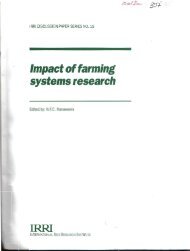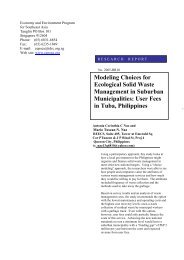Foreword - IDL-BNC @ IDRC - International Development Research ...
Foreword - IDL-BNC @ IDRC - International Development Research ...
Foreword - IDL-BNC @ IDRC - International Development Research ...
You also want an ePaper? Increase the reach of your titles
YUMPU automatically turns print PDFs into web optimized ePapers that Google loves.
1 Ecohealth: Origins and Approach<br />
on health, the World Bank and partners have developed an extensive agriculture and<br />
gender sourcebook that includes training modules for many different contexts relevant<br />
to ecohealth research (gender and food security, livelihoods, and crises) (World<br />
Bank, FAO, IFAD 2009 ) . Others have presented the case for integrating social and<br />
gender analysis in development research (Vernooy 2006 ) . Beyond the development<br />
and adaptation of analytical tools, there is a need for further conceptual development<br />
of the implications of gender and social inequities in ecohealth research, education,<br />
and practice. This appears to be an area ripe for new contributions from<br />
experiences in ecohealth research.<br />
Principle 6: Knowledge to Action<br />
The notion that knowledge from research is used to improve health and well-being<br />
through an improved environment is fundamental to an ecosystem approach to<br />
health. A variety of terms are used to describe this process, but in the context of<br />
ecohealth, knowledge-to-action is preferred to the commonly-used knowledge<br />
translation . The point is not to achieve some near-prefect level of knowledge before<br />
making a change (the translation). In transdisciplinary and participatory research<br />
involving decision-makers, the situation may be changing while new knowledge is<br />
being produced over time through a series of research–action cycles. Other authors<br />
have defi ned knowledge-to-action in health research to include trailoring of knowledge<br />
and a defi ned number of steps for sustained use of knowledge (Graham et al.<br />
2006 ), but these steps are not always applicable in ecohealth research.<br />
That research conditions change at the onset of participatory research is widely<br />
understood in social science research (e.g. Bernard 2000 ) , but is not as commonly<br />
considered in public health. Many of the case studies in this book describe in detail<br />
how the research became an ongoing intervention process, and yet some of them<br />
also invoke epidemiological designs like case-control studies, wherein conditions<br />
are assumed to remain the same or where changes are measured and controlled in<br />
the analysis. This tension between scientifi c endeavour and action to improve sometimes<br />
terrible conditions of people and their environment is characteristic of ecohealth<br />
research. <strong>Research</strong>ers have a responsibility to be aware of this tension and to<br />
document both pre-existing conditions and changes wrought by the research process.<br />
Outcome mapping (Earl et al. 2001 ) can be a useful tool for this.<br />
The innovations, actions, and changes that result from ecohealth research involve<br />
multiple sectors, agencies, and stakeholders. In addition, ecohealth research may<br />
generate unintended positive (and sometimes negative) outcomes that can be diffi -<br />
cult to link to the results of research or to the original research question. Ethical<br />
dilemmas are expected to arise – and researchers who anticipate and consider these<br />
beforehand are sometimes better equipped to navigate them (Funtowicz and Ravetz<br />
2008 ; Lambert et al. 2003 ) .<br />
There is already a strong emphasis on uptake and application of knowledge in<br />
public health (Pablos-Mendez et al. 2005 ; WHO 2004 ) as refl ected in the concepts<br />
17

















